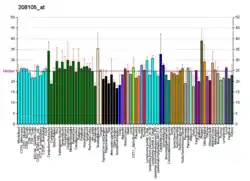Gastric inhibitory polypeptide receptor
The gastric inhibitory polypeptide receptor (GIP-R), also known as the glucose-dependent insulinotropic polypeptide receptor, is a protein that in humans is encoded by the GIPR gene.[5][6] GIP-R is a member of the 7-transmembrane protein family, a class of G protein
coupled receptors.[7] GIP-R is found on beta-cells in the pancreas.[8][9]
Function
Gastric inhibitory polypeptide (GIP), also called glucose-dependent insulinotropic polypeptide, is a 42-amino acid polypeptide synthesized by K cells of the duodenum and small intestine. It was originally identified as an activity in gut extracts that inhibited gastric acid secretion and gastrin release, but subsequently was demonstrated to stimulate insulin release potently in the presence of elevated glucose. The insulinotropic effect on pancreatic islet beta-cells was then recognized to be the principal physiologic action of GIP. Together with glucagon-like peptide-1, GIP is largely responsible for the secretion of insulin after eating. It is involved in several other facets of the anabolic response.[5]
References
- GRCh38: Ensembl release 89: ENSG00000010310 - Ensembl, May 2017
- GRCm38: Ensembl release 89: ENSMUSG00000030406 - Ensembl, May 2017
- "Human PubMed Reference:". National Center for Biotechnology Information, U.S. National Library of Medicine.
- "Mouse PubMed Reference:". National Center for Biotechnology Information, U.S. National Library of Medicine.
- "Entrez Gene: gastric inhibitory polypeptide receptor".
- Stoffel M, Fernald AA, Le Beau MM, Bell GI (August 1995). "Assignment of the gastric inhibitory polypeptide receptor gene (GIPR) to chromosome bands 19q13.2-q13.3 by fluorescence in situ hybridization". Genomics. 28 (3): 607–609. doi:10.1006/geno.1995.1203. PMID 7490109.
- NCBI, NCBI Gene entry 2696 (GIPR), retrieved 2018-12-20.
- "Gastrointestinal Hormones and Peptides". Retrieved 2007-08-24.
- Brubaker PL, Drucker DJ (2002). "Structure-function of the glucagon receptor family of G protein-coupled receptors: the glucagon, GIP, GLP-1, and GLP-2 receptors". Recept. Channels. 8 (3–4): 179–188. doi:10.1080/10606820213687. PMID 12529935.
Further reading
- Yamada Y, Seino Y (2005). "Physiology of GIP--a lesson from GIP receptor knockout mice". Horm. Metab. Res. 36 (11–12): 771–774. doi:10.1055/s-2004-826162. PMID 15655707.
- Gremlich S, Porret A, Hani EH, et al. (1995). "Cloning, functional expression, and chromosomal localization of the human pancreatic islet glucose-dependent insulinotropic polypeptide receptor". Diabetes. 44 (10): 1202–1208. doi:10.2337/diabetes.44.10.1202. PMID 7556958.
- Volz A, Göke R, Lankat-Buttgereit B, et al. (1995). "Molecular cloning, functional expression, and signal transduction of the GIP-receptor cloned from a human insulinoma". FEBS Lett. 373 (1): 23–29. doi:10.1016/0014-5793(95)01006-Z. PMID 7589426. S2CID 25033358.
- Usdin TB, Mezey E, Button DC, et al. (1994). "Gastric inhibitory polypeptide receptor, a member of the secretin-vasoactive intestinal peptide receptor family, is widely distributed in peripheral organs and the brain". Endocrinology. 133 (6): 2861–2870. doi:10.1210/en.133.6.2861. PMID 8243312.
- Yamada Y, Hayami T, Nakamura K, et al. (1996). "Human gastric inhibitory polypeptide receptor: cloning of the gene (GIPR) and cDNA". Genomics. 29 (3): 773–776. doi:10.1006/geno.1995.9937. PMID 8575774.
- Gallwitz B, Witt M, Morys-Wortmann C, et al. (1997). "GLP-1/GIP chimeric peptides define the structural requirements for specific ligand-receptor interaction of GLP-1". Regul. Pept. 63 (1): 17–22. doi:10.1016/0167-0115(96)00019-5. PMID 8795084. S2CID 42462407.
- N'Diaye N, Tremblay J, Hamet P, et al. (1998). "Adrenocortical overexpression of gastric inhibitory polypeptide receptor underlies food-dependent Cushing's syndrome". J. Clin. Endocrinol. Metab. 83 (8): 2781–2785. doi:10.1210/jc.83.8.2781. PMID 9709947.
- Tseng CC, Zhang XY (2000). "Role of G protein-coupled receptor kinases in glucose-dependent insulinotropic polypeptide receptor signaling". Endocrinology. 141 (3): 947–952. doi:10.1210/en.141.3.947. PMID 10698169.
- Bollag RJ, Zhong Q, Phillips P, et al. (2000). "Osteoblast-derived cells express functional glucose-dependent insulinotropic peptide receptors". Endocrinology. 141 (3): 1228–1235. doi:10.1210/en.141.3.1228. PMID 10698200.
- Strausberg RL, Feingold EA, Grouse LH, et al. (2003). "Generation and initial analysis of more than 15,000 full-length human and mouse cDNA sequences". Proc. Natl. Acad. Sci. U.S.A. 99 (26): 16899–16903. doi:10.1073/pnas.242603899. PMC 139241. PMID 12477932.
- Baldacchino V, Oble S, Hamet P, et al. (2003). "Partial characterisation of the 5' flanking region of the human GIP receptor (GIPR) gene". Endocr. Res. 28 (4): 577. doi:10.1081/ERC-120016843. PMID 12530665. S2CID 32639335.
- Antonini SR, N'Diaye N, Hamet P, et al. (2003). "Analysis of the putative promoter region of the GIP receptor gene (GIPR) in GIP-dependent Cushing's syndrome (CS)". Endocr. Res. 28 (4): 755–756. doi:10.1081/ERC-120017003. PMID 12530694. S2CID 21467413.
- Manhart S, Hinke SA, McIntosh CH, et al. (2003). "Structure-function analysis of a series of novel GIP analogues containing different helical length linkers". Biochemistry. 42 (10): 3081–3088. doi:10.1021/bi026868e. PMID 12627975.
- Ding KH, Zhong Q, Isales CM (2003). "Glucose-dependent insulinotropic peptide stimulates thymidine incorporation in endothelial cells: role of endothelin-1". Am. J. Physiol. Endocrinol. Metab. 285 (2): E390–6. doi:10.1152/ajpendo.00509.2002. PMID 12721154.
- Grimwood J, Gordon LA, Olsen A, et al. (2004). "The DNA sequence and biology of human chromosome 19". Nature. 428 (6982): 529–535. doi:10.1038/nature02399. PMID 15057824.
- Hansotia T, Baggio LL, Delmeire D, et al. (2004). "Double incretin receptor knockout (DIRKO) mice reveal an essential role for the enteroinsular axis in transducing the glucoregulatory actions of DPP-IV inhibitors". Diabetes. 53 (5): 1326–1335. doi:10.2337/diabetes.53.5.1326. PMID 15111503.
- Gerhard DS, Wagner L, Feingold EA, et al. (2004). "The status, quality, and expansion of the NIH full-length cDNA project: the Mammalian Gene Collection (MGC)". Genome Res. 14 (10B): 2121–2127. doi:10.1101/gr.2596504. PMC 528928. PMID 15489334.
- Baldacchino V, Oble S, Hamet P, et al. (2005). "The Sp transcription factor family is involved in the cellular expression of the human GIP-R gene promoter". Endocr. Res. 30 (4): 805–806. doi:10.1081/ERC-200044046. PMID 15666829. S2CID 40407171.
External links
- "Glucagon Receptor Family: GIP". IUPHAR Database of Receptors and Ion Channels. International Union of Basic and Clinical Pharmacology.
- gastric+inhibitory+polypeptide+receptor at the US National Library of Medicine Medical Subject Headings (MeSH)
This article incorporates text from the United States National Library of Medicine, which is in the public domain.




